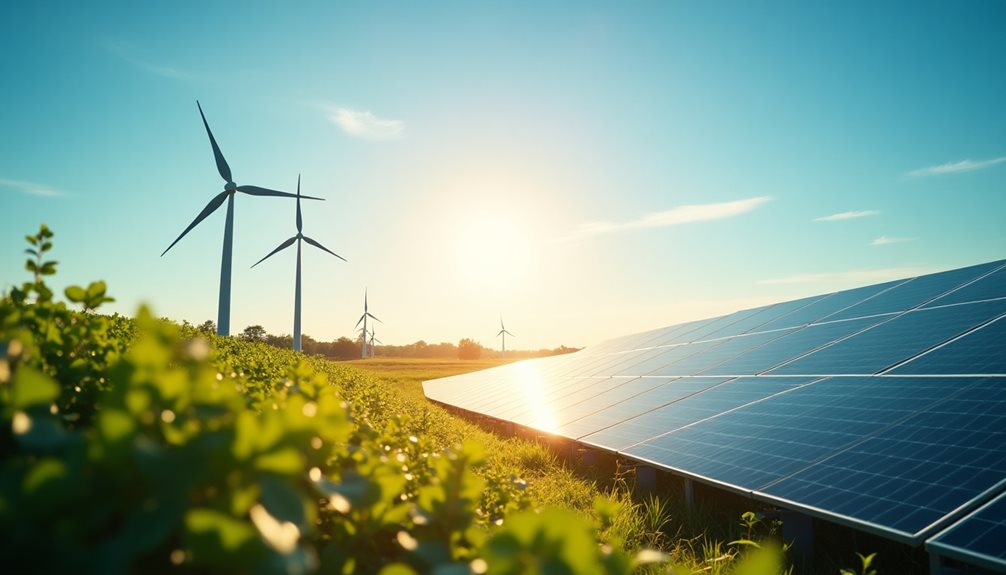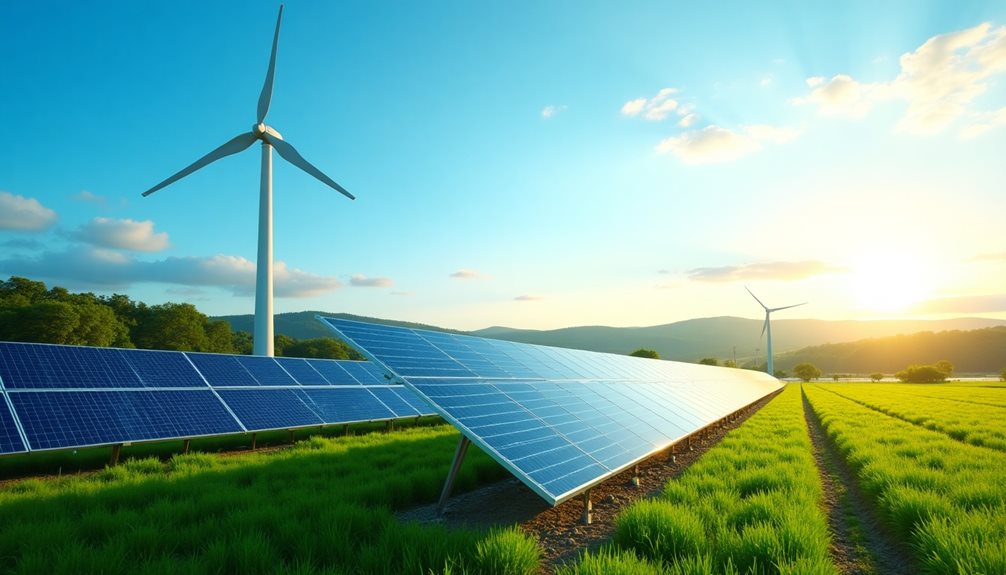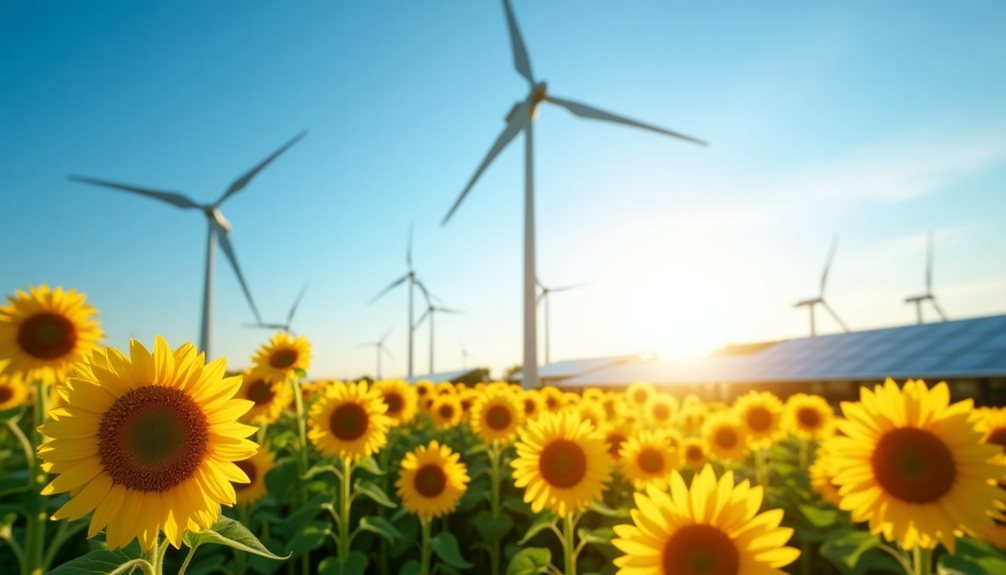Table of Contents
ToggleUnderstanding Renewable Energy: Основные Понятия

Renewable energy encompasses a range of technologies and practices aimed at harnessing natural resources to produce energy sustainably. The основные источники of renewable energy include solar, wind, hydro, biomass, and geothermal energy.
Each source utilizes natural processes that replenish over time, distinguishing them from fossil fuels. The ecological преимущества of adopting renewable energy are significant; they include reduced greenhouse gas emissions, lower air and water pollution, and minimized habitat destruction.
Solar Energy: Солнечная Энергия
Solar energy, or солнечная энергия (solnechnaya energiya), is a popular topic in renewable energy discussions worldwide. This technology harnesses sunlight through solar panels, converting it into electricity for residential and commercial use.
Solar energy uses sunlight to produce electricity or heat. The most common method is through solar panels (солнечные панели), which are installed on rooftops, fields, or even integrated into buildings. Larger installations are called solar farms (солнечные электростанции).
Types of Solar Energy Use
- Residential: Homes use rooftop solar panels for electricity or hot water.
- Commercial: Businesses power their operations or reduce energy costs with solar arrays.
- Industrial: Factories and plants may use large-scale solar farms.
Advantages (Преимущества)
- Environmentally Friendly: Solar power does not emit greenhouse gases.
- Cost Savings: After installation, electricity from the sun is free.
- Low Maintenance: Panels require little upkeep.
- Scalable: Systems can be small (for homes) or very large (for cities).
Example: In Russia, regions with many sunny days, such as Краснодарский край (Krasnodar Krai), are especially suitable for solar installations.
Related Russian Terms Table
| Русский (Cyrillic) | English Phonetic | English Definition |
|---|---|---|
| солнечная энергия | solnechnaya energiya | solar energy |
| солнечная панель | solnechnaya panel’ | solar panel |
| фотоэлектрический элемент | fotoelektricheskiy element | photovoltaic cell |
| солнечная электростанция | solnechnaya elektrostantsiya | solar power plant (solar farm) |
| возобновляемая энергия | vozobnovlyaemaya energiya | renewable energy |
| энергия солнца | energiya solntsa | energy of the sun |
| установка солнечных панелей | ustanovka solnechnykh paneley | installation of solar panels |
| электроснабжение | elektrosnabzhenie | electricity supply |
| экологически чистый | ekologicheski chisty | environmentally friendly (eco-friendly) |
| снижение затрат | snizhenie zatrat | cost reduction |
| снижение выбросов | snizhenie vybrosov | emission reduction |
Learning these terms will help you discuss solar energy in Russian and understand related articles, news, or technical manuals.
Wind Energy: Ветроэнергетика
Wind energy, known as ветроэнергетика (vet-ro-en-er-gyé-ti-ka) in Russian, is one of the most important and fastest-growing sources of renewable energy in today’s world. This technology uses the power of moving air, or ветер (vé-ter), to create electricity. Wind energy is considered clean because it doesn’t produce harmful emissions or rely on burning fossil fuels.
At the heart of wind energy systems are ветряные турбины (vet-rya-NÝ-ye tur-BÉE-ny), which means “wind turbines” in Russian. These are tall towers with large blades that spin when the wind blows. The spinning motion turns a generator inside the turbine, converting the кинетическая энергия (ki-ne-TI-ches-ka-ya e-ner-GEE-ya), or “kinetic energy,” of the wind into electrical energy.
One of the major developments in recent years has been the rise of морские ветряные станции (mor-SKÍ-ye vet-rya-NÝ-ye STÁN-tsii), or “offshore wind farms.” These are groups of wind turbines built out at sea, where winds are usually stronger and more stable than on land. Offshore wind farms can produce much more electricity because they take advantage of these powerful and consistent winds.
Key facts about wind energy:
- Wind energy is renewable, meaning we will never run out of it as long as the wind keeps blowing.
- The largest wind turbines can be more than 200 meters tall, almost as high as a skyscraper.
- Modern wind turbines are highly efficient and can start generating electricity even at low wind speeds.
- Countries like Denmark, Germany, China, and the United States are leaders in wind energy production.
Some useful Russian words and phrases related to this topic:
- Электричество (e-lek-TRÍ-chest-vo) — Electricity
- Возобновляемая энергия (vo-zob-nov-LYÁ-e-ma-ya e-NER-gi-ya) — Renewable energy
- Генератор (ge-ne-RÁ-tor) — Generator
- Производство энергии (pro-iz-VOD-stvo e-NER-gii) — Energy production
- Эффективность (ef-fek-TIV-nost’) — Efficiency
As countries continue to look for ways to reduce their reliance on fossil fuels (ископаемое топливо — is-ko-PÁ-e-moe TÓP-li-vo), wind energy will play an even bigger role in providing clean, sustainable power for homes and businesses around the world.
As the world shifts towards sustainable practices, wind energy stands out as an essential component in the quest for freedom from fossil fuel dependence.
Hydropower: Гидроэнергетика
Hydropower, known in Russian as гидроэнергетика, is among the oldest and most widely used sources of renewable energy in the world. By capturing the kinetic energy of moving water—usually from rivers, streams, or artificial reservoirs—hydroelectric power plants (гидроэлектростанции) can generate large amounts of electricity with minimal environmental impact compared to fossil fuels. This process typically involves directing water through turbines (турбины), which then spin generators (генераторы) to produce electrical energy.
One of the major advantages of hydropower is its ability to supply consistent, reliable energy (надежное электроснабжение). Unlike solar or wind power, which depend on weather conditions, water flow can be regulated, especially when dams (плотины) are used. This makes hydropower a valuable tool for balancing supply and demand on the electrical grid (электрическая сеть).
Key benefits of hydropower include:
- Significant reduction in greenhouse gas emissions (значительное сокращение выбросов парниковых газов): Hydropower produces virtually no direct emissions during operation, helping combat climate change.
- Low operational costs (низкие эксплуатационные расходы): After the initial investment in infrastructure, maintenance and running costs remain relatively low compared to coal or gas plants.
- Small land footprint (минимальное земельное воздействие): While dam construction can impact local ecosystems, hydropower plants generally use less land than solar or wind farms of similar output.
- Water storage and flood control (накопление воды и контроль наводнений): Reservoirs can store water for dry periods and help manage river flow, protecting downstream areas from flooding.
- Job creation and economic support (создание рабочих мест и поддержка экономики): The construction and operation of hydro facilities contribute to local employment and can stimulate regional economies.
Hydropower also integrates well with other renewables (интеграция с другими возобновляемыми источниками энергии), such as solar and wind. For example, during periods of high renewable output, hydropower stations can reduce generation and conserve water for use when other sources are less available.
Recent innovations in small-scale hydroelectric systems (малые гидроэлектростанции) and environmentally sensitive designs aim to minimize impacts on fish populations and river ecosystems (экосистемы рек), making modern hydropower more sustainable than ever before.
As countries seek greater energy independence (энергетическая независимость) and commit to reducing carbon emissions, hydropower remains a cornerstone for clean, reliable, and flexible electricity production.
Biomass and Biofuels: Биомасса и Биотопливо
Biomass and biofuels are key components of the global shift toward renewable energy, harnessing the chemical energy stored in organic materials to produce heat, electricity, and liquid fuels. Biomass refers to any biological material derived from living or recently living organisms, including plant matter (such as wood, straw, and crop residues), animal waste, and even algae. These resources are abundant and widely distributed, making biomass an accessible source of energy across different regions.
Biofuels, on the other hand, are fuels produced directly or indirectly from biomass. The most common biofuels are bioethanol and biodiesel. Bioethanol is typically made by fermenting sugars found in crops like corn or sugarcane, while biodiesel is produced from vegetable oils or animal fats through a process called transesterification. Advanced biofuels are also being developed from non-food biomass, such as lignocellulosic materials (wood chips, grasses) and algae, which can further reduce competition with food production.
Biomass is a broad term for any organic matter that can be used to generate energy. This includes materials such as:
- Древесина (wood)
- Солома (straw)
- Сельскохозяйственные остатки (agricultural residues)
- Животные отходы (animal waste)
- Водоросли (algae)
Biofuels are produced from biomass. The two most common are:
- Биоэтанол (bioethanol): Made from crops like corn or sugarcane.
- Биодизель (biodiesel): Made from vegetable oils or animal fats.
There are advanced biofuels, too, made from sources that don’t compete with food crops, such as wood chips and algae.
Main Conversion Technologies
- Сжигание (combustion): Burning solid biomass to produce heat or electricity.
- Анаэробное сбраживание (anaerobic digestion): Producing biogas from organic waste without oxygen.
- Ферментация (fermentation): Turning plant sugars into ethanol using microbes.
- Пиролиз (pyrolysis) and Газификация (gasification): High-temperature methods to make liquid fuels or syngas.
Key Advantages
- Biomass is often почти углеродно-нейтральна (almost carbon neutral).
- It helps with уменьшение отходов (waste reduction) by using byproducts and waste.
- It supports энергетическая безопасность (energy security) by reducing dependence on imports.
Challenges
- Risk of вырубка лесов (deforestation)
- Possible конкуренция с продовольственными культурами (competition with food crops)
- Need for улучшение технологий (improved technologies)
Related Russian Terms Table
| Russian Word/Phrase | English Phonetic | English Definition |
|---|---|---|
| Биомасса | biomassa | Biomass |
| Биотопливо | biotoplivo | Biofuel |
| Древесина | drevesina | Wood |
| Солома | soloma | Straw |
| Сельскохозяйственные остатки | selskokhozyaystvennye ostatki | Agricultural residues |
| Животные отходы | zhivotnye otkhody | Animal waste |
| Водоросли | vodorosli | Algae |
| Биоэтанол | bioetanol | Bioethanol |
| Биодизель | biodizel | Biodiesel |
| Сжигание | szhiganiye | Combustion |
| Анаэробное сбраживание | anaerobnoe sbrazhivaniye | Anaerobic digestion |
| Ферментация | fermentatsiya | Fermentation |
| Пиролиз | piroliz | Pyrolysis |
| Газификация | gazifikatsiya | Gasification |
| Углеродно-нейтральный | uglerodno-neitral’nyy | Carbon-neutral |
| Отходы | otkhody | Waste |
| Энергетическая безопасность | energeticheskaya bezopasnost’ | Energy security |
| Вырубка лесов | vyrubka lesov | Deforestation |
| Конкуренция с продовольственными культурами | konkurentsiya s prodovol’stvennymi kulturami | Competition with food crops |
| Улучшение технологий | uluchsheniye tekhnologiy | Improved technologies |
Energy Efficiency: Энергоэффективность

Energy efficiency (энергоэффективность, [yeh-ner-goh-ef-fek-teév-nost’]) is a cornerstone of sustainable progress. It means getting the same or better results while using less energy—without compromising comfort, convenience, or productivity. Instead of asking people to do less, energy efficiency focuses on smarter choices, modern technologies, and better management to reduce waste and make every unit of energy count.
How Energy Efficiency Works
Across all areas—industry (промышленность, [pra-meesh-len-nost’]), business, homes, and transportation (транспорт, [tráns-port])—energy efficiency delivers significant benefits. In factories, installing energy-saving motors (энергосберегающие двигатели, [yeh-ner-goh-zbeh-ree-gá-yu-shchi-ye dvig-a-te-lee]) and automating processes can cut energy use by up to 30%. Office buildings can switch to LED lighting (светодиодное освещение, [svye-ta-dee-ód-na-ye os-ve-shché-ni-ye]), use smart thermostats (умный термостат, [oom-ny ter-mo-stát]), and set schedules to avoid wasting power after hours. At home, using efficient appliances (энергоэффективная техника, [yeh-ner-goh-ef-fek-teev-na-ya tékh-ni-ka]) and adding insulation (изоляция, [ee-zo-lyá-tsi-ya]) keeps rooms comfortable while lowering bills.
In transportation, electric vehicles (электромобили, [eh-lek-tra-mo-bee-lee]) and reliable public transit reduce the amount of fuel needed for travel. Modern trains (поезда, [pa-ez-dá]) and buses (автобусы, [av-tó-boo-sy]) are designed to use less energy per passenger.
Key Advantages
- Supports Renewable Energy (возобновляемая энергия, [va-zab-nav-liá-ye-ma-ya ye-nér-gi-ya]): When society uses less energy overall, it’s easier for clean sources like solar panels (солнечные панели, [sól-neech-ny-ye pa-né-li]) and wind turbines (ветряные турбины, [vye-tree-ny-ye tour-beé-ny]) to cover a greater share of demand. This reduces dependence on fossil fuels (ископаемое топливо, [ees-ka-pá-e-mo-ye tóp-li-va]).
- Cuts Greenhouse Gas Emissions (выбросы парниковых газов, [vý-bra-sy par-ni-kó-vykh ga-zov]): Using less energy means power plants (электростанции, [eh-lek-tra-stán-tsii]), vehicles, and factories emit fewer pollutants. The International Energy Agency notes that over 40% of the emissions cuts needed for climate targets can come from efficiency improvements alone.
- Saves Money (экономит деньги, [eh-ka-nó-meet dyén’-gi]): Energy-efficient solutions help families and businesses lower their utility bills (коммунальные платежи, [ka-mu-nál’-nye pla-te-zhí]). For example, homes that follow best practices can save up to a quarter of their annual energy costs.
- Drives Innovation (развитие инноваций, [raz-vee-ti-ye ee-nah-vá-tsiy]): The push for better performance inspires new inventions like high-tech building materials (строительные материалы, [stra-ee-tel’-nye ma-te-ri-á-ly]), smart energy grids (умные энергосети, [oom-ny-ye eh-ner-go-sye-ti]), and advanced batteries (аккумуляторы нового поколения, [a-ku-mu-lyá-tory nó-va-va pa-ka-lé-ni-ya]). This creates new jobs and helps economies grow.
- Meets Regulations (соответствует нормам, [sa-at-vyet-stvu-yet nór-mam]): Many countries have strict laws about reducing energy use and emissions. Improving efficiency helps companies stay in compliance without costly penalties or fines.
Broader Impacts
When communities embrace energy efficiency, they protect natural resources (природные ресурсы, [pri-ród-ny-ye re-soór-sy]), improve air quality (качество воздуха, [ka-che-stva vóz-doo-kha]), and make their energy systems more secure (энергетическая безопасность, [eh-nyehr-ge-ti-chee-ska-ya be-zopas-nost’]). People gain more control over how much energy they use and how much they spend. Businesses become stronger competitors by lowering their operating costs.
Adopting widespread energy efficiency is fundamental for a stable and sustainable future—for people and for the environment. It not only helps preserve our planet but also gives individuals and organizations more freedom in how they manage their energy needs.
By making these changes now, society moves closer to a cleaner world where resources last longer and energy choices are smarter.
Frequently Asked Questions
What Are the Benefits of Using Renewable Energy Sources?
The benefits of using renewable energy sources include significant cost savings and enhanced energy independence. By harnessing natural resources, communities reduce reliance on fossil fuels, leading to a sustainable future that promotes environmental health and economic stability.
How Does Renewable Energy Impact the Environment?
Renewable energy considerably reduces the carbon footprint, mitigating climate change effects. By harnessing natural resources, it promotes ecosystem balance, preserving biodiversity and enhancing environmental stability, ultimately contributing to a sustainable future for all living beings.
What Are the Main Challenges in Renewable Energy Adoption?
The main challenges in renewable energy adoption include policy barriers that hinder investment and technology costs that remain high. These factors impede widespread implementation, limiting the shift to sustainable energy solutions and the pursuit of environmental freedom.
How Can Individuals Support Renewable Energy Initiatives?
Individuals can support renewable energy initiatives through community engagement and personal actions, such as advocating for sustainable practices, participating in local clean energy projects, and educating others about the benefits of shifting to renewable resources.
What Future Trends Are Expected in Renewable Energy?
Future trends in renewable energy are shaped by emerging technologies and market predictions, emphasizing advancements in solar and wind power, energy storage solutions, and decentralized energy systems, fostering both environmental sustainability and individual energy independence.



